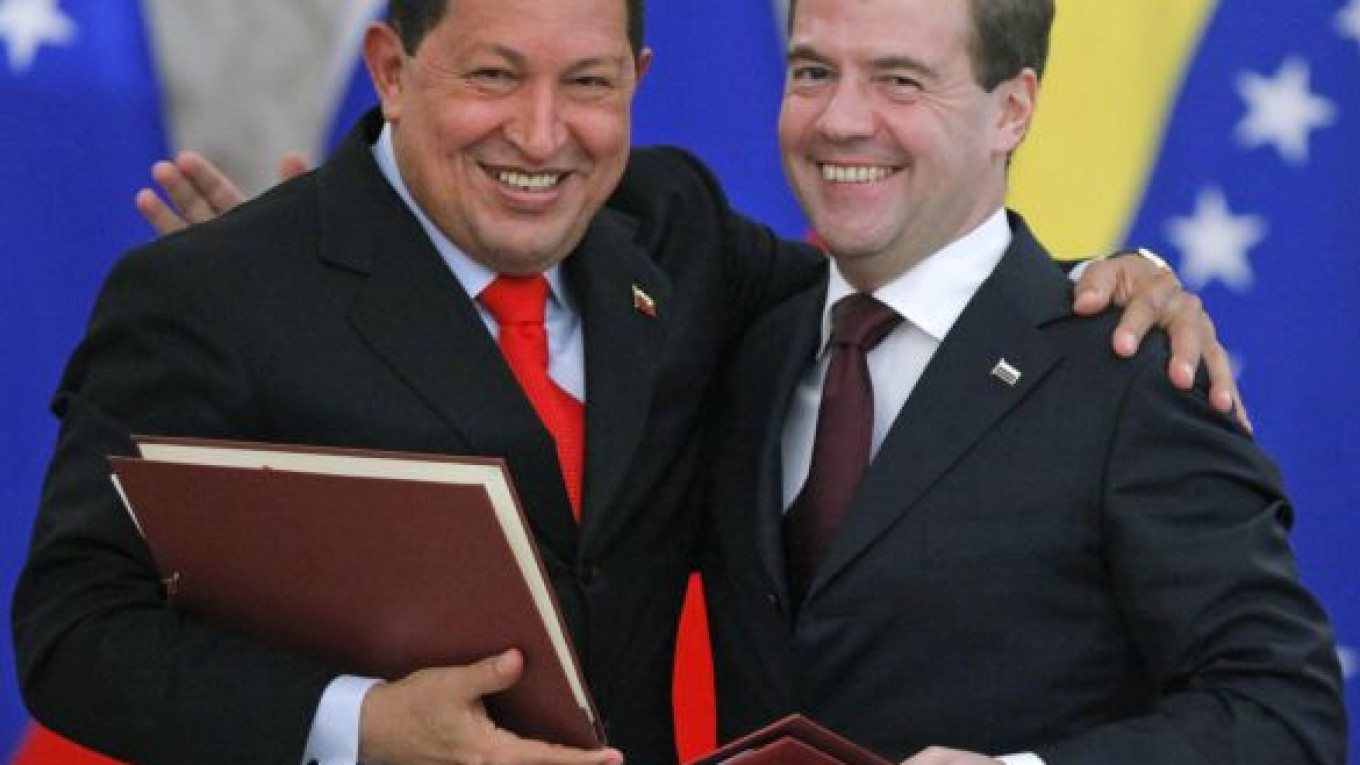Rosatom committed to build Venezuela's first nuclear power plant, while the South American country agreed to allow Rosneft and TNK-BP to purchase oil assets in Europe and Venezuela as part of a package of 10 agreements signed during a visit by President Hugo Chavez.
"A deal in the atomic sphere has just been signed. … I am not sure who will be shaken up by this, but President [Chavez] said that this will elicit different emotional responses from various countries," President Dmitry Medvedev said Friday, alluding primarily to the United States.
He emphasized that the deal was done strictly for business reasons.
The United States has been at odds with Chavez over his foreign policy and frequent outbursts against "the Yankee state.” The Venezuelan leader has said in the past that the United States was “on the way down” and used “earthquake weapons” in Haiti.
On Thursday, Chavez said “nothing will stop us” from advancing nuclear power in the country.
Rosneft on Friday signed an agreement with Petroleos de Venezuela to buy its 50 percent stake in German refinery Ruhr Oel, which is a joint venture between the Venezuelan company and British Petroleum, for $1.6 billion.
Russia and Venezuela also signed an accord supporting TNK-BP in its bid to purchase assets from BP in the South American country.
“We will buy 16.7 percent of Petromangas, 40 percent of Petroperija and 26.6 percent of Bouqeron,“ German Khan, one of TNK-BP's major shareholders, said Friday, Bloomberg reported.
The Russian visit, which was Chavez's ninth in 11 years, demonstrated the strength of the bilateral ties and included the signing of a cooperation plan for 2010 through 2014.
Rosatom agreed to build the nuclear power station after it finishes construction of a research reactor, company head Sergei Kiriyenko said Friday.
While the cost of the deal was not announced, the power plant will have two 1,200-megawatt nuclear reactors, according to a statement published on Rosatom's web site.
In mid-August, Rosatom launched Iran's first nuclear power plant after almost 40 years of on-and-off construction. Currently, the state corporation is in talks with India and has reached agreements with China and Turkey to build new reactors.
"I would like to emphasize that our intentions are clean and open: We want our partner, the Bolivarian Republic of Venezuela, to have a full range of energy choices, to have energy independence," Medvedev said.
Venezuela relies mostly on hydroelectric power and wants to reduce its dependency on oil an gas, which, Chavez says, is a model imposed by America.
Prime Minister Vladimir Putin announced Friday that Russia would deliver 35 tanks to Venezuela as part of an earlier agreement.
Chavez has bought more than $4 billion worth of Russian weaponry over the past five years, but no additional deals were announced on this trip, despite talk of potential purchases.
In the refinery deal, the crude inventory and receivables were not included because they were yet to be formally evaluated, but they are expected to bring the purchase price to as much as $2 billion.
Ruhr Oel's assets account for about 20 percent of total German refining capacity, Rosneft said in a statement.
The joint venture has stakes in four German refining and petrochemical plants, including 100 percent of Gelsenkirchen, 24 percent of MiRO, 25 percent of Bayernoil and 37.5 percent of PCK Schwedt.
“As a result of this acquisition, 18 percent of Rosneft’s refining capacity will be located in the heart of industrialized Europe," said Rosneft president Eduard Khudainatov. "Furthermore, our resource base will strengthen Ruhr Oel’s competitive position, while our growing refining and petrochemical businesses will benefit from joint ownership via Ruhr Oel of leading technologies and management practices.”
"Russian companies will now enter the European Union — I mean Germany. Russians will supply crude by sea, which perfectly suits the Russian and Venezuelan economies," Putin said at a meeting with Chavez on Friday.
The deal should be completed by the end of the year, he said.
After completing his two-day visit to Russia, Chavez flew to Belarus, where he promised to supply 30 million tons of oil for three years starting in 2011.
A Message from The Moscow Times:
Dear readers,
We are facing unprecedented challenges. Russia's Prosecutor General's Office has designated The Moscow Times as an "undesirable" organization, criminalizing our work and putting our staff at risk of prosecution. This follows our earlier unjust labeling as a "foreign agent."
These actions are direct attempts to silence independent journalism in Russia. The authorities claim our work "discredits the decisions of the Russian leadership." We see things differently: we strive to provide accurate, unbiased reporting on Russia.
We, the journalists of The Moscow Times, refuse to be silenced. But to continue our work, we need your help.
Your support, no matter how small, makes a world of difference. If you can, please support us monthly starting from just $2. It's quick to set up, and every contribution makes a significant impact.
By supporting The Moscow Times, you're defending open, independent journalism in the face of repression. Thank you for standing with us.
Remind me later.






